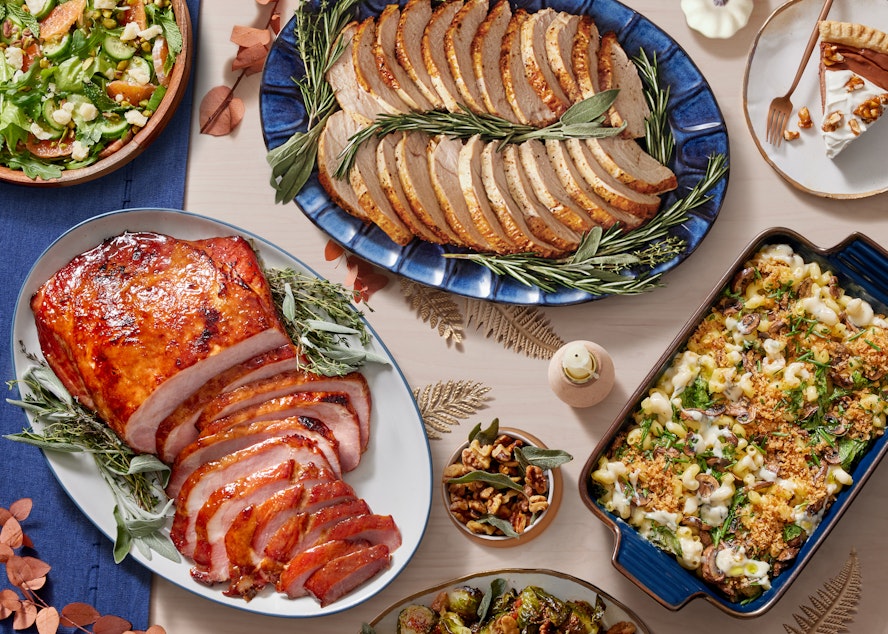Have a hara hachi bu Thanksgiving. Healthy tips for not busting your gut

For many of us, Thanksgiving is a chance to enjoy favorite foods with favorite people. What’s not to like? Maybe not that feeling an hour or so after chowing down, when you wish you hadn’t had that third helping of stuffing.
For some tips on how to avoid gut-busting during this and all holiday feast times, KUOW’s Kim Malcolm spoke to Dr. Chris Damman. He's a gastroenterologist at The University of Washington School of Medicine, and the editor of the gut health blog Gut Bites MD.
This interview has been edited for clarity.
Kim Malcolm: We know it takes our bodies longer to digest higher-fat foods. And there are so many of them right now. Tell us what's happening in our gut as we eat heavier, richer foods than we might normally eat.
Dr. Chris Damman: So the sort of gravies that have animal fats, butters, etc., will slow down digestion and absorption of the calories that you consume. And it's through many different mechanisms. One is just your stomach empties slower, but they also slow the transit of the food through the rest of the GI tract as well. And they're a bit of a double-edged sword. On the one hand, they help temper the absorption of sugar into your blood so that your blood sugar spikes less. On the other hand, fats have higher caloric density. So, gram for gram, you're getting more calories with fat than you are with either carbs or protein.
So, given that we're going to eat these rich, heavier foods, what can we do to balance our digestion and still enjoy what we want to enjoy?
Balance is such an important concept. Generally, some of the worst offenders for feeling super-full and groggy after a meal actually come from simple carbohydrates. So that would be things like juice, but also potatoes and bread and stuffing, and rolls. And the best way to temper the impact of those simple carbohydrates is to eat them with a balance of other foods. One of those is high-fiber foods. That would be things like green beans, salads, turnips, beans, nuts, and seeds, but also protein and fat can help mitigate the absorption of the sugar from those carbohydrates. So, balance is absolutely critical.
Sponsored
When it comes to overeating, it seems to me that's a very subjective area. But do you have any tips for us to avoid it and how not great we feel afterward?
I think there are some times when it's OK to indulge, and Thanksgiving tends to be one of those. But if one does want to prevent overeating, which I think is a wonderful goal all the time, there are some simple tricks. There's a concept in Japanese culture referred to as "hara hachi bu," which is to eat until you're 80% full. Because it does take some time for your brain to register how much food you've had, 80% ends up becoming more than sufficient. One other thing you can do is, as you're saying balance foods. High-fiber foods can help make us feel full sooner and feel less groggy afterward. And also, drinking liquids with our meals can make us feel more full in a good way.
That takes me to alcohol, which plays a big role for quite a few folks around the dinner table. What role does alcohol play in how our body is digesting food?
Alcohol, through several different ways, impacts blood sugar levels. If folks have diabetes, it's actually really important to check with your doctor because it can interfere with how different diabetes medications metabolize blood sugar. But one of the ways it does that is there's an enzyme that your body makes called amylase, and amylase is less effective when there's alcohol present, which means the starches and carbohydrates that we eat tend to be absorbed less as well. That's not the only impact though. When alcohol is absorbed into the liver, it's preferentially metabolized by the liver, meaning the liver produces less sugar for the blood. And so, through a couple of different mechanisms, it can cause a decrease in our blood sugar levels.
Let me just ask you a few lightning-round questions. First of all, does what time you eat make a real difference?
Sponsored
It does. It's really important to time our eating with our circadian rhythms. And that's our body's natural body clock. So, midnight snacks are probably not a good idea.
Okay, but if you eat midday or late afternoon, that's fine for sleeping?
Absolutely perfect.
Does walking off a meal help you at all?
A hundred percent. Some really fascinating research shows that even two to five minutes of walking right after a meal will dramatically decrease your blood sugar level, so you have less of a spike.
Sponsored
How about dessert? Do you need to wait? Some people just want to get right in there and get the whole thing done after they've eaten the savory courses.
Well, I'll tell you from a health standpoint, if you want to mitigate the impact of the blood sugar, it's best to have it immediately after the meal, because the rest of the meal will balance it in a better way. You also will tend to eat less of the dessert because you'll be more full.
Any suggestions for when it's safe to go to sleep after a full day of hopefully balanced feasting?
Absolutely. What determines when it's best to sleep is when the stomach is emptied. For people prone to heartburn and reflux disease, it's best to wait at least three hours because it takes that long for the stomach to empty completely.
Listen to the interview by clicking the play button above.





